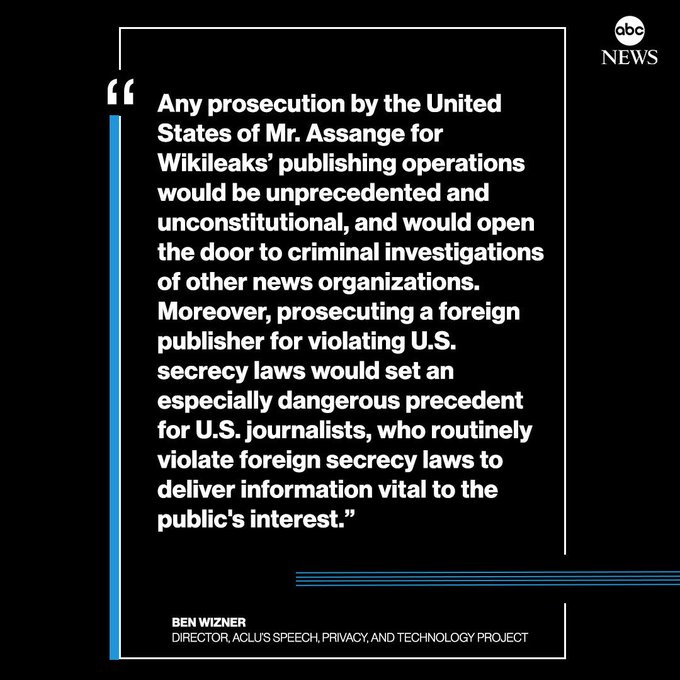Ecuadoreans have taken to the streets in the capital Quito against the arrest of WikiLeaks founder Julian Assange in the country’s embassy in London.
The arrest came after Quito suddenly revoked his seven-year asylum and handed him over to British authorities.
Police were invited into the embassy by Ecuador's ambassador on Thursday, dragging Assange out of the building, where he had been holed up for years in fear of extradition to the US.
Protesters gathered outside Ecuador’s foreign ministry building on Thursday, chanting against President Lenin Moreno and calling for Assange’s release.
"As Ecuadorean citizens we support Julian Assange, a man who has given his life to the truth, a man who has sacrificed himself and his family to tell the truth to the world. It was a source of pride that he was Ecuadorean,” said a protester.
Assange was granted asylum by Ecuador’s former president Rafael Correa, after he took refuge in the country’s embassy in 2012. President Moreno, however, revoked the asylum and allowed police to arrest him.
Moreno on Thursday called Assange a "spoiled brat" and "miserable hacker", saying that his country "will be more careful in giving asylum to people who are really worth it."
'President Moreno betrayed a higher order'
Shortly after the arrest, Correa took to Twitter and slammed his successor for “betraying” a higher order.
“Moreno is a corrupt man, but what he has done is a crime that humanity will never forget,” said Correa.
Correa also described Moreno’s decision as a “scoundrelly, cowardly and “heinous” act which is the “fruit of servility, vileness and vengeance.”
“From now on worldwide the scoundrel and betrayal can be summarized in two words: Lenin Moreno,” said Correa.
Assange aide arrested
Ecuador's Interior Minister Maria Paula Romo said authorizes had also arrested a "collaborator" of Assange in Quito’s airport as he prepared to board a flight for Japan.
Citing a senior Ecuadorian official, the Washington Times identified the person as Ola Bini, a Swedish software developer, who was living in Quito.
World reacts to Assange arrest
Russia reacted to the arrest, with President Vladimir Putin’s spokesperson Dmitry Peskov saying Moscow hopes “that all his rights will be respected.”
“All countries and political organizations that are interested in the development of democracy should take part in deciding this man’s fate,” he added.
Russian Foreign Ministry spokeswoman Maria Zakharova also condemned the arrest, saying, “The hand of ‘democracy’ squeezes the throat of freedom.”
Russian deputy chairman of the International Affairs Committee of the State Duma, the lower house of Russia’s Federal Assembly, called for international support for Assange’s rights.
"We need to use all international opportunities to protect the person who tried to expose the truth and bring information to the public that some entities carefully concealed,” said Alexey Chepa.
Assange first went to Ecuador’s London embassy when he faced a warrant for arrest following allegations of sexual assault and rape from the Swedish government. He has denied the allegations, and the investigation was closed last year.
The 47-year-old Australian computer programmer later stayed in the embassy out of concern that he would be extradited to the US to be prosecuted for publishing classified documents that were leaked by American whistleblower Chelsea Manning.
'Europe should prevent extradition'
A senior member of Germany's opposition Left party called on Europe to protect Assange from being extradited to the United States.
Sevim Dagdelen said the withdrawal of Assange's political asylum which led to his arrest was a "scandal, a violation of international law, and at the same time a severe blow to independent journalism."
She said it is the German government's "duty" now to prevent Britain from extraditing Assange to the US, "where he faces life imprisonment or even the death penalty for exposing US war crimes."
Australia not to provide special assistance to Assange: PM
Australian Prime Minister Scott Morrison said the charge against Assange is a "matter for the United States" and has nothing to do with Australia.
"Look, Julian Assange will get the same consular support and assistance that any other Australian would receive,” said Morrison.
Several dozen protesters gathered in the center of Sydney, holding signs, reading “UK, Don’t Extradite Assange to US.” They also chanted "free the truth, free Assange, don’t shoot the messenger.”
'Assange arrest threatens press freedom'
Meanwhile, journalists and free speech advocates across the world described the arrest as "a serious threat to press freedom."
An American journalist and political analyst told Press TV Assange’s arrest indicated that the West has no respect for the freedom of press.
“The freedom of press does not exist in the US or in the EU. If you publish materials exposing criminal activity by the powerful, the publisher, and not the criminal who has been exposed, would be criminally prosecuted,” Don DeBar said.
The arrest has concerned journalists and free speech advocates about how his prosecution could affect the rights of journalists around the world.
They worry that US prosecution of Assange would pave the way for Washington to launch criminal investigations into other news organizations.















No comments:
Post a Comment